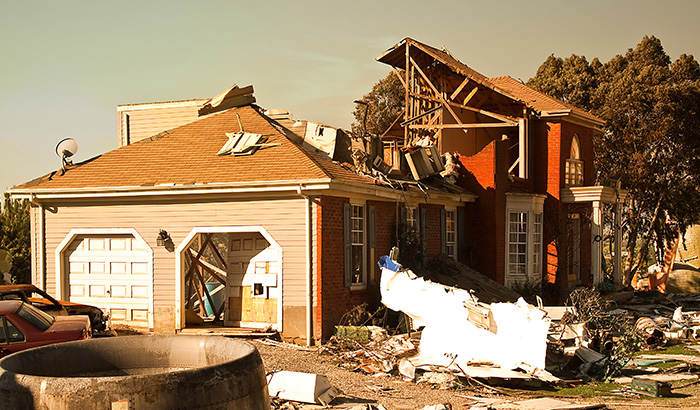Do you have earthquake insurance? Do you know what your risks are? Is earthquake insurance worth getting? We’re outlining all the questions to ask yourself to determine whether you need this insurance.
According to a recent United States Geological Survey (USGS) report, almost 75% of Americans are at risk for earthquake-related property damage. Unfortunately, damage from an earthquake is usually excluded from homeowners’ and renters’ insurance policies. If you want coverage for earthquake damage, you need to purchase a separate earthquake insurance policy.
Before investing in any insurance policy, it’s essential to research and ask yourself some questions to determine if earthquake coverage is worth getting.
Continue reading below to learn more.
7 questions to ask yourself when considering earthquake insurance
Before you invest in earthquake insurance, take the time to do your research and determine if an earthquake policy is right for you. Here are seven questions homeowners, renters, and business owners should ask themselves that will help determine whether or not they need it:
Q: What is earthquake insurance?
A: Earthquake insurance covers your property and belongings if an earthquake damages or destroys them.
Earthquake coverage home insurance; are they the same? A standard homeowners’ or renters’ insurance policy usually does not cover earthquake damage, as earthquakes do not fall under hazard insurance. If an earthquake harms your property, you will pay for repairs and restorations if you do not have an earthquake policy.
One exception may be in the event that an earthquake sparks a fire that affects your home. In that case, most homeowners’ insurance policies cover fire-related damage since these policies cover fires. This typically includes additional living expenses coverage that reimburses you for living in another place while workers repair and restore your property.
Earthquake insurance usually covers the following:
- Dwelling — Dwelling coverage includes your house and any structures attached to it. This could consist of the foundation, concrete slab floors, and attached garages.
- Other structures — This covers structures that aren’t attached to your main home structure, such as a garage, carport, pump house, storage building, and more.
- Personal property — Personal property coverage covers clothes, furniture, dishes, appliances, jewelry, rugs, instruments, and other personal belongings. Some items have “special limits,” which means the policy will only cover up to a certain amount. For example, your policy might only cover computers up to $700 and $600 on tools.
Q: Is earthquake insurance worth getting? Do I need it?
A: It’s hard to say if you “need” earthquake insurance, but it’s worth considering if you live in an earthquake-prone region. Professionals use the Modified Mercalli Intensity Scale to determine the severity of a quake. According to the USGS, the following ten states have the most substantial shaking potential:
- California
- Washington
- Utah
- Tennessee
- Oregon
- South Carolina
- Nevada
- Arkansas
- Missouri
- Illinois
However, even if you do not reside in one of the above states, don’t write off the possibility of a quake. An earthquake can happen in any of the 50 states.
Q: What are the earthquake risks and hazards where I live?
A: Determining your risk in regard to an earthquake is more challenging than finding the closest fault line. The chances of experiencing shaking from an earthquake or having property damage due to a quake depend on various factors.
The National Hazard Maps helps estimate the chances of shaking (of different frequencies and strengths) across the United States. According to the USGS, the best way to gather information about your specific earthquake risk and to make an informed decision is to click on your state on the Earthquake Information by Region page and research the information provided for your area.
Q: What type of building and foundation is your home? What about the architectural layout? Materials used?
A: There’s a saying that goes, “Earthquakes don’t kill people; buildings do.” Earthquakes may cause severe damage to the roof, siding, and foundation of your home. Older properties built before 1980 on a raised foundation are especially vulnerable to earthquakes.
Consider the construction type and structural integrity of your property. Certain building materials and designs tend to be more resilient to earthquakes, while others may be more susceptible to damage.
Of course, you cannot control the seismic hazards in your region, but you can influence one of the most important factors in saving your lives and reducing your losses from a quake: adopting and enforcing up-to-date building codes.
Structures with a basic geometrical plan typically stand well during severe earthquakes. However, those with +, V, U, and H shapes and re-entrant corners suffer significant damages. Those with an L-shaped plan may be separated into two rectangular shapes due to the isolated joint in the middle.
Factors like reinforcing the foundation, flexible connectors, and retrofitted structures will significantly improve a property’s vulnerability. If your house is older or lacks today’s safety features, consider earthquake insurance. Homeowners may want to make these structures more resilient to the effects of earthquakes by seismically retrofitting them.
Q: Can I afford earthquake damage repair, renovation, and rebuilding costs?
A: Before you invest in an insurance policy, take the time to assess the potential financial burden of an earthquake on your home. Consider the cost of repairing structural damages, replacing your personal items, and covering temporary living accommodation expenses during a recovery period.
If necessary, gather estimates from construction professionals and contractors to determine the approximate costs involved. This process will help you gauge if the potential financial burden outweighs the cost of earthquake insurance premiums.
Q: What is the land and soil like where my property is built? What is the fill material?
A: Local ground conditions and makeup will change the effects of an earthquake. Reach out to a soil engineer or local building authority to check out the soil conditions of your property and to learn about the fill material. If your property is on poor soil, consider reinforcing its foundation to withstand an earthquake.
The effects and forces of an earthquake are amplified on water-saturated soils, changing the ground from a solid to a liquid. The quicksand effect of the soil makes the ground unable to support a foundation. The ground may crack, heave, or move, causing a building to collapse or unevenly settle. Solid soil types are ideal since much less vibration transfers through the structure’s foundation.
- Unideal building soil — Silty clay, deep sand, loose gravel, soft granular soils.
- Ideal soil — Stiff soils and bedrock (unbroken, deep rock formations).
Q: How do I find earthquake insurance?
A: Earthquake coverage home insurance: remember, most standard home or business policies do not include coverage for earthquakes, so if your business or property sustains damage in an earthquake, you cannot collect compensation. Adding an earthquake policy onto your insurance policy is typically done by adding an addendum to your business or homeowner’s plan.
If you already have a homeowners insurance policy, contact your agent, and you may be able to add an earthquake insurance endorsement. If it is not available, you may want to look at buying a stand-alone policy from another company.
If you are having difficulty finding an insurance company that will sell you an earthquake policy, reach out to your state insurance department and inquire about “surplus lines.” These companies have permission to sell policies that cover risks like earthquakes when other insurance companies will not.
Consider switching providers if your provider does not offer earthquake coverage. At Bear River Mutual, we offer earthquake insurance as an option and are ready to speak with you.
Find earthquake insurance with Bear River Mutual Insurance
Are you looking for earthquake insurance? Are you still wondering, “Is earthquake insurance worth getting?” Want to learn more about Earthquake coverage home insurance and what it means for you? The professionals at Bear River Mutual are here to help!
Life is full of unexpected events and situations, and while we cannot 100% predict these unfortunate kinds of circumstances, there are things we can do to prepare for them, such as investing in insurance.
The right policy can protect you and those closest to you when these unforeseen events arise. The Bear River team will ensure you are taken care of and give you the mental rest and peace of mind you deserve.
We’re here to offer you reasonable rates and are committed to finding the ideal balance of protection and value for you and your family. Our ultimate goal is to find you and your loved ones the best coverage and rates possible. We will help you find the best solution that protects you, your family, your business, assets, and more when the unexpected happens.
As a local Utah company, we know the unique needs of businesses, renters, individuals, and families across the Wasatch Front. We have three convenient locations to best serve you: Salt Lake City, Provo, and Orem. Contact Bear River Mutual Insurance today to get your quote on affordable insurance from the best carrier around.
Don’t be left stranded without earthquake insurance; let our team help get you covered now.




